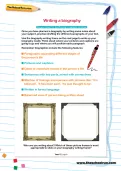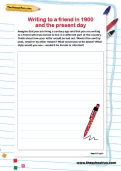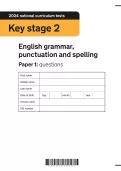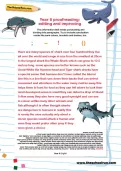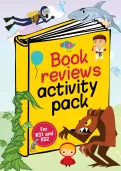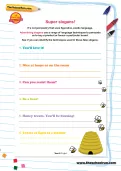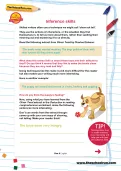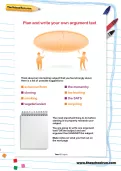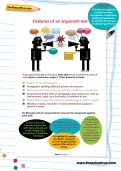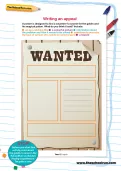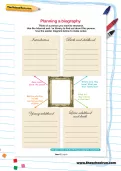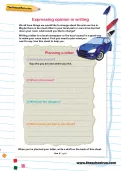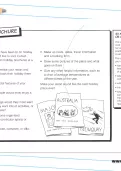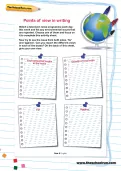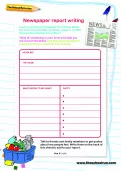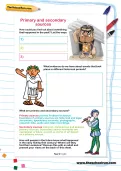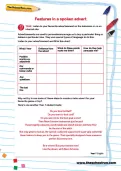Help your child prepare for the Year 6 English SATs, taken at the end of Key Stage 2, with some revision and at-home practice. These KS2 SATs past papers from 2024 are the official past papers from the Department for Education, used in schools.
or
Register to add to your saved resources
This information text needs punctuating and dividing into paragraphs. Try to include punctuation marks like semi colons, brackets and dashes, too.
or
Register to add to your saved resources
Already a subscriber? to view this content.
Help your child explore books and language with TheSchoolRun's Book reviews activity pack, a huge collection of reading comprehension and creative writing resources for Year 1 to Year 6.
or
Register to add to your saved resources
Already a subscriber? to view this content.
Have a look at this text message from Jamie to his mum. Does the language sound appropriate? Then see if you can re-write this message as an informal letter. Think about including slang (but no text-speak!), different punctuation and first names.
or
Register to add to your saved resources
Already a subscriber? to view this content.
In the letter below a child is writing to his head teacher to demand justice. Do you think his head teacher will be impressed? Would the writer be more likely to be listened to if he wrote in a more formal style?
or
Register to add to your saved resources
Already a subscriber? to view this content.
It’s not just poetry that uses figurative, poetic language. Advertising slogans use a range of language techniques to persuade us to buy a product or favour a particular brand. See if you can identify the techniques used in these fake slogans.
or
Register to add to your saved resources
Already a subscriber? to view this content.
Skilled writers often use a technique we might call ‘show not tell’. They use the actions of characters, or the situation they find themselves in, to tell us more about them, rather than spelling their meaning out and explaining it to us directly. Can you use your inference skills on this passage?
or
Register to add to your saved resources
Already a subscriber? to view this content.
Think about an interesting subject that you feel strongly about. You are going to write one argument text FOR the subject and one argument text AGAINST the subject. Start by doing some research
or
Register to add to your saved resources
Already a subscriber? to view this content.
Argument texts are non-fiction texts that show someone’s point of view about a particular subject. Go through both 'An argument for zoos' and 'An argument against zoos' and see if you can answer these questions.
or
Register to add to your saved resources
Already a subscriber? to view this content.
A poster is designed to find a volunteer to search for the goblin and his magical potion (from the story 'The goblin's curse'). What do you think it said? Include: an eye-catching title; a colourful picture; information about the problem and how it needs to be solved; adjectives to describe the type of person who needs to come forward; a reward.
or
Register to add to your saved resources
Already a subscriber? to view this content.
Use this biography writing frame to write a biography. Think about where your pictures and captions are going to go and where you will position each paragraph. Don't forget all the important features of a biography!
or
Register to add to your saved resources
Think of a person you want to research. Use the Internet and / or library to find out about this person. Use the spider diagram below to make notes about their birth, young adulthood, later adulthood and death.
or
Register to add to your saved resources
Already a subscriber? to view this content.
What would your child like to change about the area you live in? This Year 6 activity helps them to practise expressing their opinion by writing a letter to a newspaper or the local council.
or
Register to add to your saved resources
Already a subscriber? to view this content.
What's your child's dream holiday destination? Their task is to write a leaflet advertising it to persuade people to book their holiday there. They'll need to understand holiday-brochure writing, select the right style and write persuasively. Can their writing convince you to visit?
or
Register to add to your saved resources
Already a subscriber? to view this content.
Does your child feel passionately about the environment? Encourage them to see the argument from both sides and present two pieces of writing, one 'for' and one 'against', about a given issue.
or
Register to add to your saved resources
Already a subscriber? to view this content.
It's your child's turn to make the front page! Ask them to plan and report on a local issue, interviewing friends and family to get quotes.It will help them understand how newspaper reports are written, as well as encouraging them to become more aware of a local issue.
or
Register to add to your saved resources
How do we find out about the past? What evidence is available to us, and how can we research events that happened over 100 years ago? This worksheet will help your child develop an understanding of the passing of time and encourage them to think historically.
or
Register to add to your saved resources
Already a subscriber? to view this content.
This worksheet encourages your child to read through news reports, picking out the important facts in order to summarise them.
or
Register to add to your saved resources
This practical worksheet encourages your child to analyse a spoken advert and then use some of the same kind of persuasive language in their own writing.
or
Register to add to your saved resources
Already a subscriber? to view this content.
Do you know the difference between an open and a closed question? Use both to conduct and interview and evaluate which work best!
or
Register to add to your saved resources
